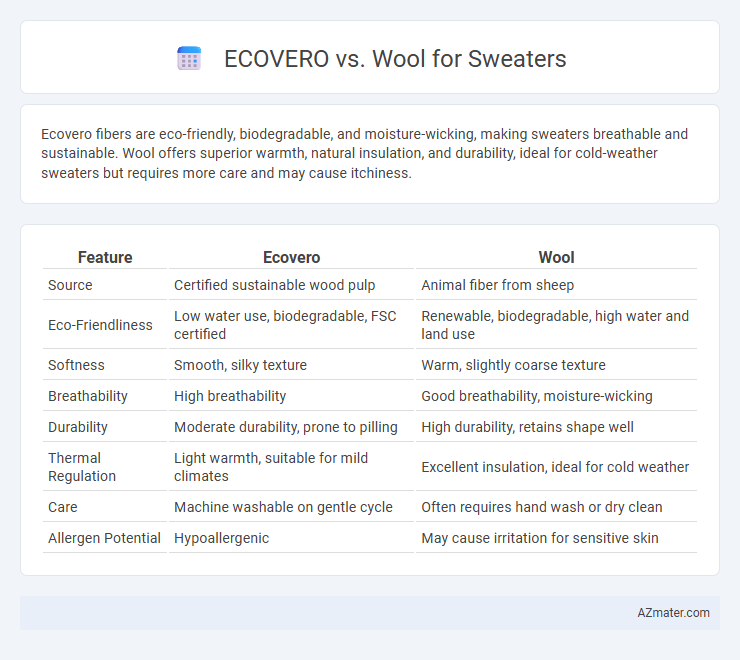Ecovero fibers are eco-friendly, biodegradable, and moisture-wicking, making sweaters breathable and sustainable. Wool offers superior warmth, natural insulation, and durability, ideal for cold-weather sweaters but requires more care and may cause itchiness.
Table of Comparison
| Feature | Ecovero | Wool |
|---|---|---|
| Source | Certified sustainable wood pulp | Animal fiber from sheep |
| Eco-Friendliness | Low water use, biodegradable, FSC certified | Renewable, biodegradable, high water and land use |
| Softness | Smooth, silky texture | Warm, slightly coarse texture |
| Breathability | High breathability | Good breathability, moisture-wicking |
| Durability | Moderate durability, prone to pilling | High durability, retains shape well |
| Thermal Regulation | Light warmth, suitable for mild climates | Excellent insulation, ideal for cold weather |
| Care | Machine washable on gentle cycle | Often requires hand wash or dry clean |
| Allergen Potential | Hypoallergenic | May cause irritation for sensitive skin |
Overview: What Are Ecovero and Wool?
Ecovero is a sustainable fabric made from certified renewable wood sources processed with environmentally responsible technology, offering a biodegradable and eco-friendly alternative for sweaters. Wool, a natural fiber harvested from sheep, provides excellent insulation, moisture-wicking properties, and breathability, making it a classic choice for warmth and durability in sweater production. Both fibers present unique benefits, with Ecovero emphasizing sustainability and softness, while wool excels in thermal regulation and traditional appeal.
Sustainability: Ecovero vs. Wool
Ecovero fibers, derived from sustainable wood pulp sourced from certified forests, offer a low-impact alternative to traditional fabrics with reduced water and energy consumption during production. Wool, a natural fiber obtained from sheep, is renewable and biodegradable but involves higher greenhouse gas emissions and land use challenges linked to livestock farming. Choosing Ecovero over wool for sweaters supports a lower environmental footprint by minimizing chemical usage and fostering responsible forestry practices.
Material Source and Production Process
Ecovero fibers are derived from sustainably managed wood sources using a closed-loop production process that reduces environmental impact and water usage significantly compared to conventional viscose. Wool is a natural protein fiber obtained from sheep through shearing, involving a renewable, biodegradable material with relatively low processing emissions. While Ecovero emphasizes eco-friendly chemical recovery and resource efficiency, wool production focuses on animal welfare and land use in pastoral systems.
Comfort and Feel: Which is Softer?
Ecovero fibers offer a soft, silky texture that feels smooth against the skin, making sweaters lightweight and breathable. Wool, particularly merino or cashmere, is renowned for its natural warmth and superior softness, providing a cozy and plush feel ideal for colder climates. While Ecovero excels in softness and moisture-wicking, wool delivers unmatched insulation and a traditional, luxurious comfort.
Warmth and Insulation Properties
Ecovero fibers offer moderate warmth due to their moisture-wicking properties but lack significant insulation compared to wool, making them suitable for lightweight sweaters. Wool excels in insulation and warmth because of its crimped fibers that trap air, providing superior thermal regulation even in cold and damp conditions. Choosing wool over Ecovero ensures enhanced warmth retention and better heat insulation for sweaters in colder climates.
Moisture Management and Breathability
Ecovero fibers offer superior moisture management by efficiently wicking sweat away from the skin, keeping the wearer dry and comfortable during physical activity. Wool naturally excels in breathability, allowing air to circulate and regulate temperature, which helps prevent overheating and provides insulation even when damp. Both materials balance moisture control and breathability, with Ecovero favoring quick-drying performance and wool providing natural temperature regulation and odor resistance.
Durability and Longevity
Ecovero fibers offer enhanced durability due to their sustainable viscose composition, maintaining shape and color longer than traditional wool. Wool provides natural resilience with excellent elasticity and warmth retention, but it may be prone to pilling and wear over time. Sweaters made with Ecovero blends tend to resist fading and maintain structural integrity better under frequent washing compared to pure wool garments.
Care and Maintenance Differences
Ecovero sweaters require gentle machine washing on a cold cycle and air drying to maintain fabric integrity and vibrancy, while wool sweaters often need hand washing or dry cleaning to prevent shrinking and felting. Wool fibers demand careful handling with mild detergents and the use of a wool-specific shampoo to preserve softness and elasticity, whereas Ecovero, a sustainable viscose, is more resistant to pilling and can better tolerate delicate machine washing. Proper storage for wool involves folding to avoid stretching, while Ecovero garments maintain shape even when hung, reflecting key care distinctions that impact the longevity and appearance of these sweater materials.
Allergies and Skin Sensitivity
Ecovero fibers are derived from sustainably sourced wood pulp and are known for their hypoallergenic properties, making them suitable for sensitive skin and reducing the risk of allergic reactions. Wool, especially untreated or coarse variants, can cause itchiness, irritation, and allergic responses due to lanolin and natural oils present in the fibers. For individuals with allergies or sensitive skin, Ecovero sweaters offer a gentler alternative compared to traditional wool, as they minimize inflammation and discomfort while maintaining breathability and softness.
Ethical and Environmental Considerations
Ecovero fibers are produced from certified sustainable wood sources using eco-friendly processes that significantly reduce water and energy consumption, making them a more environmentally responsible choice compared to traditional wool. Wool production involves animal welfare concerns and higher greenhouse gas emissions due to sheep farming, impacting its overall ethical and environmental footprint. Choosing sweaters made from Ecovero supports sustainable forestry and lower carbon emissions, while wool offers natural biodegradability but with a higher ecological cost linked to livestock farming.

Infographic: Ecovero vs Wool for Sweater
 azmater.com
azmater.com